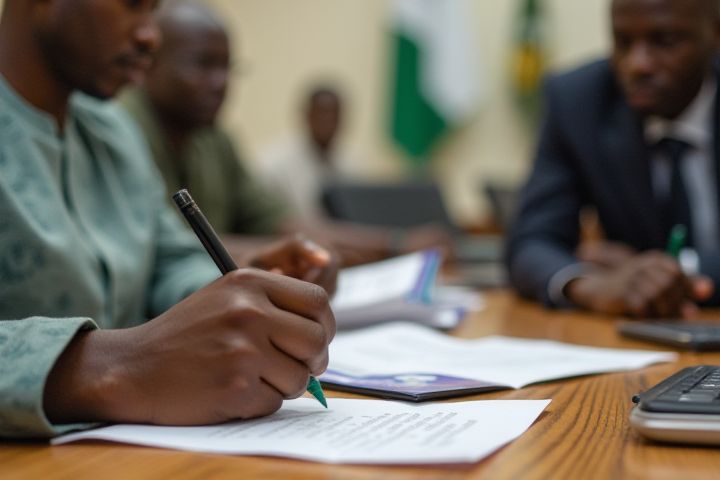
Elections in Nigeria are a critical aspect of the country's democratic process, influencing political stability and governance. The Independent National Electoral Commission (INEC) oversees the electoral management, ensuring transparency and fairness in the voting process. Presidential, gubernatorial, and legislative elections are held every four years, drawing significant participation from various political parties, including the All Progressives Congress (APC) and the People's Democratic Party (PDP). Voter registration efforts are crucial, as they aim to increase civic engagement and ensure that you have a voice in shaping Nigeria's future. Challenges such as electoral violence, logistical issues, and voter apathy often mar the electoral landscape, highlighting the need for continued reforms in the electoral system.
Independent National Electoral Commission
The Independent National Electoral Commission (INEC) plays a crucial role in overseeing Nigeria's electoral process, ensuring transparency and fairness in elections. Established to manage the conduct of elections and voter registration, INEC is responsible for the delineation of electoral boundaries and the organization of polling stations. As the body that certifies election results, INEC's integrity is vital to maintaining public trust in Nigeria's democracy. Voter education initiatives by INEC aim to increase civic participation and inform citizens about their electoral rights and responsibilities.
Presidential and National Assembly elections
Nigerian elections primarily center around the Presidential and National Assembly elections, which are crucial in shaping the country's political landscape. The Presidential election determines the head of state and government, while the National Assembly, comprising the Senate and the House of Representatives, is responsible for legislative functions. Voter registration, electoral transparency, and security measures play significant roles in ensuring a fair electoral process. Understanding the dynamics of these elections can enhance your awareness of Nigeria's democratic governance and civic engagement opportunities.
Gubernatorial and State Assembly elections
Elections in Nigeria encompass crucial Gubernatorial and State Assembly elections, which play a vital role in shaping regional governance. These elections determine the leaders who will implement policies affecting various aspects of daily life, including education, healthcare, and infrastructure development. Voter participation is essential, as it empowers citizens to influence local political landscapes and hold elected officials accountable. Engaging in these elections ensures that your voice contributes to the democratic process and the future direction of state governance.
Multiple political parties
Elections in Nigeria feature a variety of political parties, including the All Progressives Congress (APC) and the People's Democratic Party (PDP), which dominate the political landscape. Each election cycle brings forth a multitude of smaller parties that seek to represent diverse interests and ideologies, reflecting the country's complex ethnic and regional dynamics. Voter engagement is significant, with millions participating in the democratic process, influencing governance at local, state, and national levels. Understanding the multiple party system is crucial for grasping the intricacies of Nigerian politics and the impact on policy development.
Two-round voting system
In Nigeria, the electoral process often employs a two-round voting system to ensure that candidates achieve a majority of votes for election to various offices. If no candidate secures the required majority in the first round, a second round is held, allowing voters to choose between the top two candidates. This system aims to enhance electoral legitimacy and encourage broader voter participation, as it gives citizens a second chance to express their preferences. Understanding this system is crucial for engaging with Nigeria's political landscape and its implications for governance and representation.
Voter registration process
In Nigeria, the voter registration process is a critical component of the electoral system, enabling citizens to participate in democratic governance. The Independent National Electoral Commission (INEC) oversees this process, ensuring that eligible voters can easily register using both online and in-person methods. This initiative aims to enhance electoral participation and reduce voter apathy, which has historically plagued the democratic landscape in Nigeria. By promoting awareness and accessibility, you can play a role in strengthening the foundation of democracy in the nation.
Role of security forces
The role of security forces in Nigeria's elections is critical for maintaining order and ensuring a fair democratic process. The Nigerian Police Force, alongside the military, is tasked with preventing electoral violence, protecting voters, and securing polling stations. Their effectiveness directly impacts voter turnout and public trust in the electoral system. Furthermore, enhanced training and community engagement initiatives are essential for security agencies to foster a safer electoral environment and uphold the integrity of Nigeria's democracy.
Electoral violence concerns
Elections in Nigeria are often marred by electoral violence, which poses significant challenges to the democratic process. Incidents of intimidation, attacks on polling stations, and violent clashes between political factions can undermine voter turnout and erode public confidence in the electoral system. To combat this, the Independent National Electoral Commission (INEC) has implemented strategies, including increased security measures and voter education campaigns, aimed at fostering a peaceful electoral environment. Your awareness of these issues can contribute to meaningful discussions about enhancing electoral integrity and ensuring a safe voting experience for all citizens.
Electronic voting and technology
Elections in Nigeria increasingly leverage electronic voting technology to enhance transparency and efficiency in the electoral process. The Independent National Electoral Commission (INEC) has implemented biometric data verification to ensure the integrity of voter registration and reduce electoral fraud. Smart card readers and online results transmission systems play critical roles in promoting timely and accurate vote counting. As these technological advancements continue to evolve, they aim to bolster public trust in the democratic process while encouraging higher voter participation.
Election monitoring and observers
In Nigeria, elections are closely monitored by various local and international observers to ensure transparency and fairness in the electoral process. These observers play a crucial role in assessing compliance with electoral laws and identifying potential irregularities. An effective election monitoring system can enhance public confidence in the outcomes, contributing to political stability and democratic governance. Your participation in the electoral process, whether as a voter or an observer, can significantly impact the integrity of democracy in the region.
